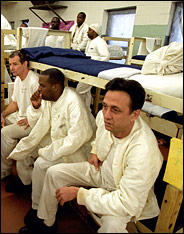
HARVEST, Ala. - If there was ever a prison that needed help, it was Limestone Correctional Facility.
Even within the troubled Alabama penal system, this state compound near Huntsville was notorious for cruel punishment and medical neglect. In one drafty, rat-infested warehouse once reserved for chain gangs, the state quarantined its male prisoners with H.I.V. and AIDS, until the extraordinary death toll - 36 inmates from 1999 to 2002 - moved inmates to sue and the government to promise change.
(snip)
A low-key but tenacious woman who had a run-in with an earlier employer, Dr. Chijide says the care at Limestone was far from adequate, and there is evidence to support her. In February, the month she resigned, the court monitor described an H.I.V. unit riddled with rats, where broken windows had been replaced with plastic sheeting that was itself falling apart. Thousands of doses of prescribed medications had never been given, as far as the monitor could tell from the slapdash records. No one was being tested for tuberculosis or treated for hepatitis C, which prey on fragile immune systems.
(snip)
An emaciated 39-year-old wasted away after begging a doctor for sandwiches. A 29-year-old with pneumonia was short of breath when he arrived at the unit, but waited two days to see a doctor and get a prescription; he never received the medication, and on the fourth day, he suffocated.
A 41-year-old, also struggling to breathe, was sent off to a hospital two hours away in a prison van with no medical help, even after a guard urged that he be rushed in an ambulance. "He'll be fine," a nurse said, but the man had a heart attack on the way and died.
Treatment was not much better for those who survived. Packed into bunks so close that infectious abscesses "spread like wildfire," Dr. Tabet wrote, they were rousted at 3 a.m. to stand in line outdoors, often in the cold or rain, to get their pills.
(snip)
Dr. Chijide said the executives blamed her for the unit's troubles, accusing her of seeing too few patients, coming and going as she pleased, and documenting too many problems. If the monitor found Prison Health out of compliance with the settlement, she said they told her, it would not be good for the company - or her.
Undeterred, Dr. Chijide wrote to them again, saying she had been scapegoated. Prison Health suspended her, but prepared for the inspection by granting some of the things she had asked for, including a nurse. The prison staff set out fresh rat traps.
And with Dr. Chijide gone and the monitor about to arrive, a Prison Health doctor raced through more than 100 medical charts in two or three days, jotting notes to make it appear that prisoners had received proper physical examinations.
The monitor was not fooled. "Patients allege that this physician spent a few minutes with each of them, did not touch them, did not answer questions, and rarely looked up from his writing," he wrote. The company's last-minute efforts, he said, "do not meet any reasonable standard of H.I.V. care."
(snip)
Prompted by his findings, the Southern Center for Human Rights, which filed the original inmate lawsuit, asked a federal judge to hold the company in contempt for violating the settlement; he has not ruled. Human Rights Watch asked Gov. Bob Riley of Alabama to take immediate action to ensure the state's compliance; a spokesman for the governor would not comment.
Well, I'm sure the real cause of the neglect of inmates in Alabama is the failure of the federal courts to allow Judge Roy Moore to keep his ten commandments monument on court grounds where the faithful could worship it.

1 comment:
Excellent post! Is the honorable Senator following in the steps of Kristof? Hadn't heard a word about this.
You're punchline reference to Moore and commandment fetish was great.
Another angle could be Guanabama or Bamtonamo - similiarities, linkages?
Post a Comment